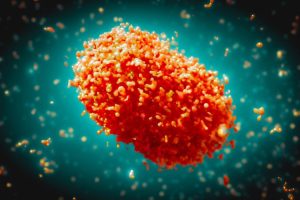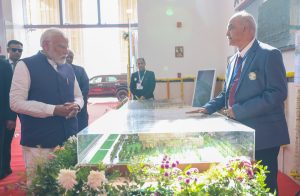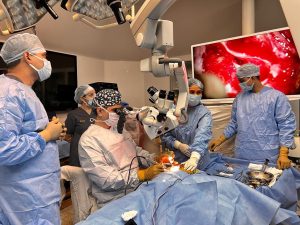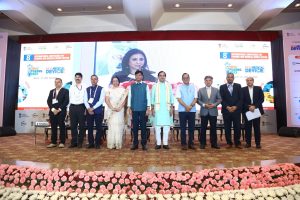Bausch Health, Glenmark announce approval of RYALTRIS in Canada


NEW DELHI: Arogya World is thrilled to be selected as a recipient of the 2022 UN Interagency Task Force and the WHO Special Programme on Primary Health Care Award. The award recognized Arogya World for its work in scaling up community-based delivery models to strengthen prevention and control of diabetes at the population level, across 19 states in India.
Expressing her views, Dr Nalini Saligram, Founder & CEO, Arogya World, said, “This is a proud moment for us, as Arogya World is the only non-profit working in India to receive this prestigious award. This is global recognition for the work that my team has been doing for more than a decade, working tirelessly on the prevention of NCDs at the population level in India. We thank Dr Venkat Narayan from Emory University for nominating us, and thank all our partners and supporters for helping us improve the health of millions of Indians throughout our vast country. This award spurs us on to do more, with a greater sense of responsibility, and continue to implement well-designed programs that deliver measurable public health impact.”
The 2022 Awards were presented to winners during the UN General Assembly High-Level Meeting in New York, at the UN Interagency Task Force for the Prevention and Control on Noncommunicable Diseases Friends of the Task Force side event on 21 September 2022. All the recipients were recognized for their achievements during 2021 on multisectoral action in the prevention and control of NCDs, mental health and the wider NCD-related Sustainable Development Goals (SDGs).
Arogya World takes this opportunity to congratulate the Ministry of Health & Family Welfare, India and The Indian Council of Medical Research (ICMR) who were one of the winners in the government category for the India Hypertension Control Initiative.
NCDs, which include heart disease, diabetes, cancer, chronic lung diseases, and also mental health, cause 74% of deaths globally and are increasingly recognised as one of the leading health and development challenges of the century. WHO and compelling clinical studies have shown that 80% of heart disease, 80% of diabetes and 40% of cancers can be prevented with 3 lifestyle changes eat right, increase physical activity, and avoid tobacco. This is what can help prevent diabetes in the first place and prevent it from worsening, from leading to heart disease, kidney disease or stroke or blindness, and ultimately leading to very poor quality of life. But overworked healthcare providers and staff in crowded under-resourced hospitals and clinics simply don’t have the time to give this important lifestyle advice. This is where non profits like Arogya World come in to give the critical “Lifestyle Change Prescription” to everyone patients, caregivers and healthy young people alike, and help them all progress on their individual health journeys. Non profits like Arogya World are an essential part of the extended healthcare ecosystem, as they provide preventive healthcare and bring about behaviour change in the community setting, which means doctors and healthcare providers can be spared to take care of the patients who need urgent medical care.
Arogya World follows a doorstep health model, and takes prevention to people where they live, learn and work. Having reached more than 7.5 million people across rural and urban areas, with 1 million among them being at lower socio-economic levels, living on <$5.50 a day, Arogya World drives its purpose through 4 key programs Healthy Schools, Healthy Workplaces, mDiabetes and MyThali. A fifth program Arogya City is to start this year. The COVID era has highlighted that this prevention mission is now more urgent and important than ever before because people with underlying NCDs have worse negative health outcomes from COVID infection.
Arogya World’s goal is to further scale its science-based programs, working collaboratively with multiple partners and government, and continue to contribute towards India meeting the Sustainable Development Goals (SDGs).
Source: Press Trust of India




